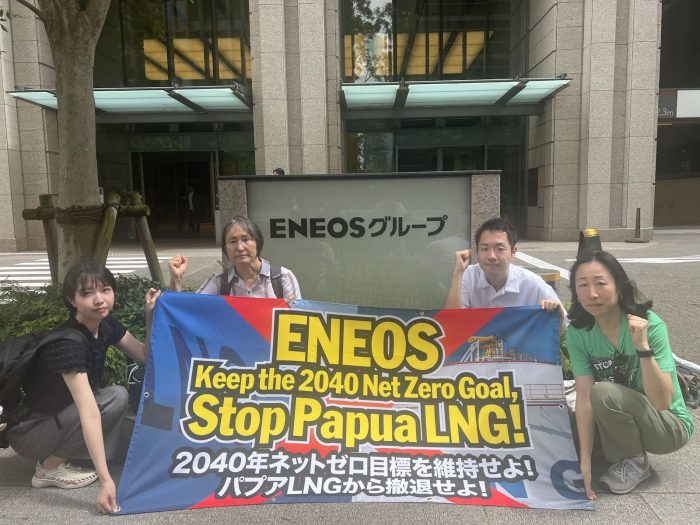Press release: Criticism was raised at the ENEOS annual general meeting over its huge net-zero target year postponement
June 30, 2025
Press release:
Criticism was raised at the ENEOS annual general meeting over its huge net-zero target year postponement
– Environmental NGOs urged ENEOS to stop the Papua LNG project –
Japan Center for a Sustainable Environment and Society (JACSES)
Friends of the Earth Japan
Mekong Watch
Kiko Network
Oil Change International
On June 26, in front of the venue of the annual general meeting of ENEOS Holdings, Inc. (hereinafter “ENEOS”), environmental NGOs took an action calling them to bring back its net zero target year from 2050 to 2040, the year it held before its recent policy amendment, and also to stop the Papua LNG project. The project has been criticized for causing serious environmental impacts and human rights violations, and 15 banks worldwide have declared they will not provide financing for it. An environmental NGO staff member who participated in the annual general meeting as a shareholder asked how the project is aligned with the 1.5-degree goals of the Paris Agreement. ENEOS management responded that it needed to cope with uncertainties in the energy transition and mentioned that the project is in line with the Japanese Government’s Strategic Energy Plan. However, it did not provide any evidence showing that the project is aligned with the 1.5-degree goals.

Action in front of the ENEOS’ head office
In its “Basic Carbon Neutral Plan” formulated in May 2023 (*1), ENEOS had set a target of achieving carbon neutrality for Scope 1 and 2 greenhouse gas (GHG) emissions by fiscal year (FY) 2040. However, in the revised “Basic Carbon Neutral Plan FY2025 Edition” (*2) released in May 2025, this target was significantly pushed back, with the goal now set for FY2050—marking a major retreat in just two years. The carbon intensity target for energy supply was also weakened. While the previous plan aimed to achieve 44g-CO2/MJ by FY2040, the revised plan now targets to reduce only 20-50% from FY2020 levels by 2040, which is estimated to result in 45-72 g-CO2/MJ. Furthermore, the previous plan had included a policy to establish Japan’s largest CO2-free hydrogen production and supply this system by FY2040, however, this was removed in the revised plan. Instead, a new policy was introduced emphasizing the stable supply of so-called “low-carbon energy sources” such as LNG. ENEOS also describes carbon capture and storage (CCS) technology as one of its strengths in the revised plan, showing its continued commitment to fossil fuel operations.
ENEOS is one of the project owners of the Papua LNG project in Papua New Guinea. However, the project faces critical issues, including misalignment with the 1.5-degree goals of the Paris Agreement, a lack of Free, Prior and Informed Consent (FPIC) from affected Indigenous Peoples and profound biodiversity risks, with over 60 species in the project area never studied by external science (*3). As a result of global NGO campaigns urging financial institutions not to support the Papua LNG project, fifteen banks—including Export Finance Australia, BNP Paribas, and Crédit Agricole— have committed not to provide loans for the Papua LNG project (*4).
In May 2025, ENEOS Power, which operates power plants in Japan, submitted a Document on Primary Environmental Impact Consideration for the construction of an LNG power plant, tentatively called the “Ougimachi Gas Power Plant.” The plan is to develop a single unit with a capacity of approximately 750MW, aiming to begin operations in the first half of 2033. It is estimated that the plant would emit around 1.5 to 1.7 million tons of CO2 annually (*5). The company possesses power plants with a total generation capacity of 2.2 GW in Japan, and in recent years, there has been a surge in new LNG-fired power plant operations and project plans. Considering the full life cycle—including extraction and transportation—there is little basis to claim that GHG emissions from LNG-fired power are significantly lower than those from coal-fired power.
ENEOS should keep its previous climate targets and policies, including achieving carbon neutrality by FY2040, and withdraw from new fossil fuel projects including the Papua LNG project and the Ougimachi Gas Power Plant.
Contact:
Japan Center for a Sustainable Environment and Society (JACSES)
Yuki Tanabe
tanabe@jacses.org
Ayako Honkawa
honkawa@jacses.org
Note:
*1:https://www.hd.eneos.co.jp/company/system/pdf/e_hd_jp_ot_fy2023_01.pdf
*2:https://www.hd.eneos.co.jp/about/carbon_neutral/pdf/index_01.pdf
*3:https://fairfinance.jp/media/gbhnaemm/papua_lng0716.pdf
*4:https://jacses.org/2673/
*5:https://kikonet.org/content/37813




